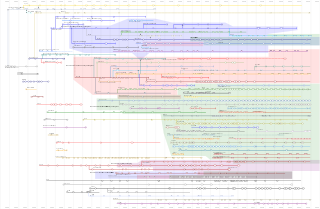
A browser war is a competition for dominance in the usage share of web browsers. The "first browser war" (1995–2001) consisted of Internet Explorer and Netscape Navigator, and the "second browser war" (2004-2017) between Internet Explorer, Firefox, and Google Chrome.
This is a comparison of both historical and current web browsers based on developer, engine, platform(s), releases, license, and cost.
libevent is a software library that provides asynchronous event notification. The libevent API provides a mechanism to execute a callback function when a specific event occurs on a file descriptor or after a timeout has been reached. libevent also supports callbacks triggered by signals and regular timeouts.
A browser extension is a software module for customizing a web browser. Browsers typically allow users to install a variety of extensions, including user interface modifications, cookie management, ad blocking, and the custom scripting and styling of web pages.

Google Chrome is a web browser developed by Google. It was first released in 2008 for Microsoft Windows, built with free software components from Apple WebKit and Mozilla Firefox. Versions were later released for Linux, macOS, iOS, and also for Android, where it is the default browser. The browser is also the main component of ChromeOS, where it serves as the platform for web applications.
V8 is a JavaScript and WebAssembly engine developed by Google for its Chrome browser. V8 is free and open-source software that is part of the Chromium project and also used separately in non-browser contexts, notably the Node.js runtime system.
Google Native Client (NaCl) is a discontinued sandboxing technology for running either a subset of Intel x86, ARM, or MIPS native code, or a portable executable, in a sandbox. It allows safely running native code from a web browser, independent of the user operating system, allowing web apps to run at near-native speeds, which aligns with Google's plans for ChromeOS. It may also be used for securing browser plugins, and parts of other applications or full applications such as ZeroVM.

SRWare Iron is a Chromium-based web browser developed by the German company SRWare. It primarily aims to eliminate usage tracking and other privacy-compromising functionality that the Google Chrome browser includes. Iron ships with certain Chromium privacy options switched on by default, it provides some additional features that distinguish it from Google Chrome.

Chromium is a free and open-source web browser project, primarily developed and maintained by Google. It is a widely-used codebase, providing the vast majority of code for Google Chrome and many other browsers, including Microsoft Edge, Samsung Internet, and Opera. The code is also used by several app frameworks.

ChromeOS, sometimes styled as chromeOS and formerly styled as Chrome OS, is a Linux distribution developed and designed by Google. It is derived from the open-source ChromiumOS, based on the Linux kernel, and uses the Google Chrome web browser as its principal user interface.
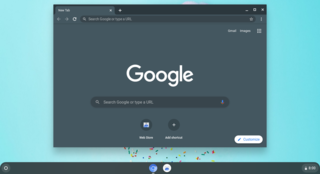
ChromiumOS is a free and open-source Linux distribution designed for running web applications and browsing the World Wide Web. It is the open-source version of ChromeOS, a Linux distribution made by Google.
WebP is a raster graphics file format developed by Google intended as a replacement for JPEG, PNG, and GIF file formats. It supports both lossy and lossless compression, as well as animation and alpha transparency.

The Chromium Embedded Framework (CEF) is an open-source software framework for embedding a Chromium web browser within another application. This enables developers to add web browsing functionality to their application, as well as the ability to use HTML, CSS, and JavaScript to create the application's user interface.
A headless browser is a web browser without a graphical user interface.
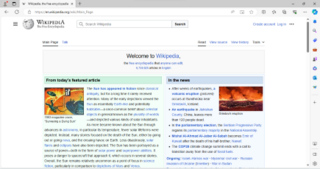
Microsoft Edge is a proprietary cross-platform web browser created by Microsoft. Released in 2015 as part of Windows 10 and Xbox One, it was initially built with Microsoft's own proprietary browser engine, EdgeHTML, and their Chakra JavaScript engine. Later on, it was ported to Android and iOS as a fork of Google's Chromium open-source project. In late 2018, Microsoft announced it would completely rebuild Edge as a Chromium-based browser with Blink and V8 engines, which allowed the browser to be ported to macOS. The new Edge was publicly released in January 2020, and on Xbox platforms in 2021. Microsoft has since terminated security support for the original browser. Edge is also available on older Windows versions, as well as Linux.
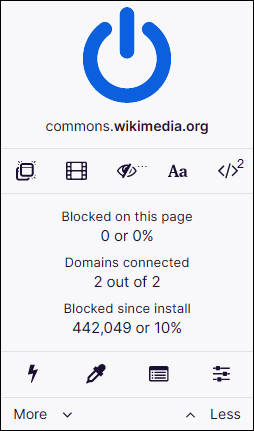
uBlock Origin is a free and open-source browser extension for content filtering, including ad blocking. The extension is available for Chrome, Chromium, Edge, Firefox, Brave, Opera, Pale Moon, as well as versions of Safari before 13. uBlock Origin has received praise from technology websites and is reported to be much less memory-intensive than other extensions with similar functionality. uBlock Origin's stated purpose is to give users the means to enforce their own (content-filtering) choices.
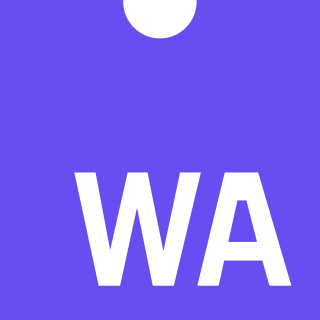
WebAssembly defines a portable binary-code format and a corresponding text format for executable programs as well as software interfaces for facilitating interactions between such programs and their host environment.

Cub Linux was a computer operating system designed to mimic the desktop appearance and functionality of ChromeOS. It was based on Ubuntu Linux LTS 14.04 "Trusty Tahr". It used Openbox as the window manager and tools taken from LXDE, Gnome, XFCE as well as a number of other utilities. It was a cloud-centric operating system that was heavily focused on the Chromium Browser. Cub Linux's tagline was "Cub = Chromium + Ubuntu".
JPEG XL is a royalty-free raster-graphics file format that supports both lossy and lossless compression. It is designed to outperform existing raster formats and thus become their universal replacement.
ungoogled-chromium is a free and open-source variant of the Chromium web browser that removes all Google-specific web services. It achieves this with a series of patches applied to the Chromium codebase during the compilation process. The result is functionally similar to regular Chromium.










